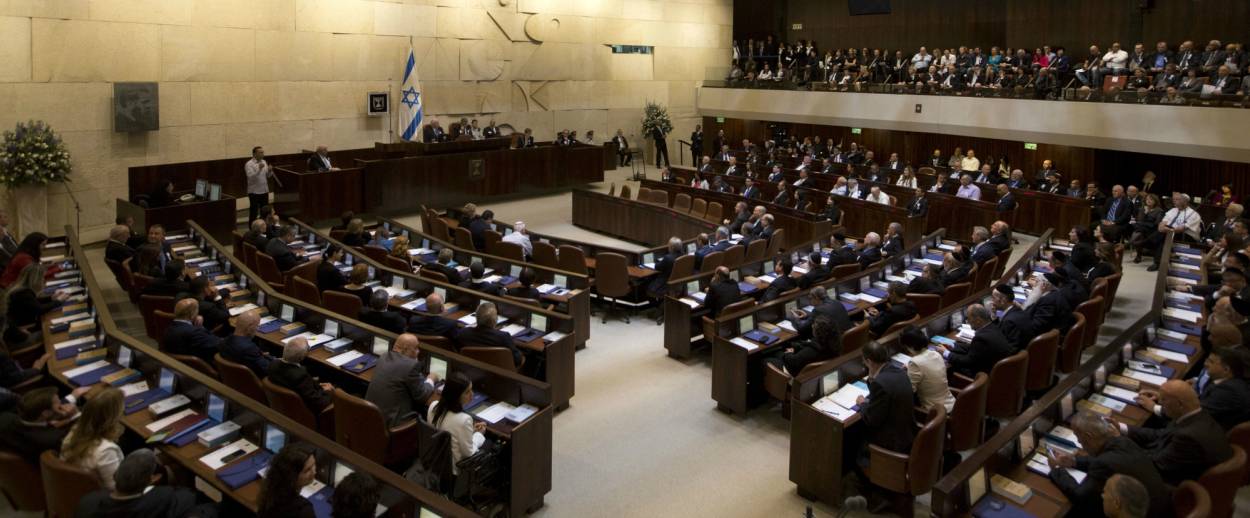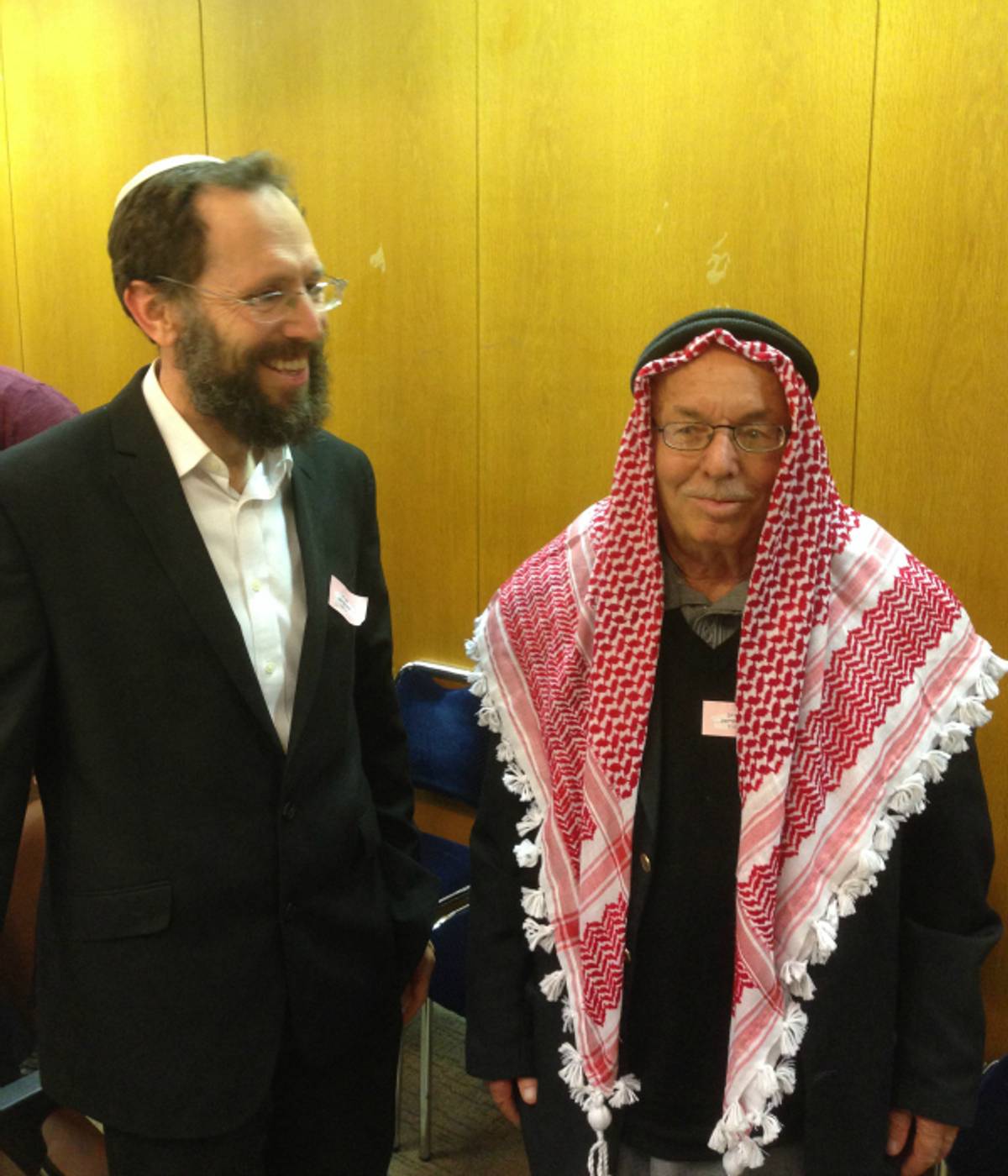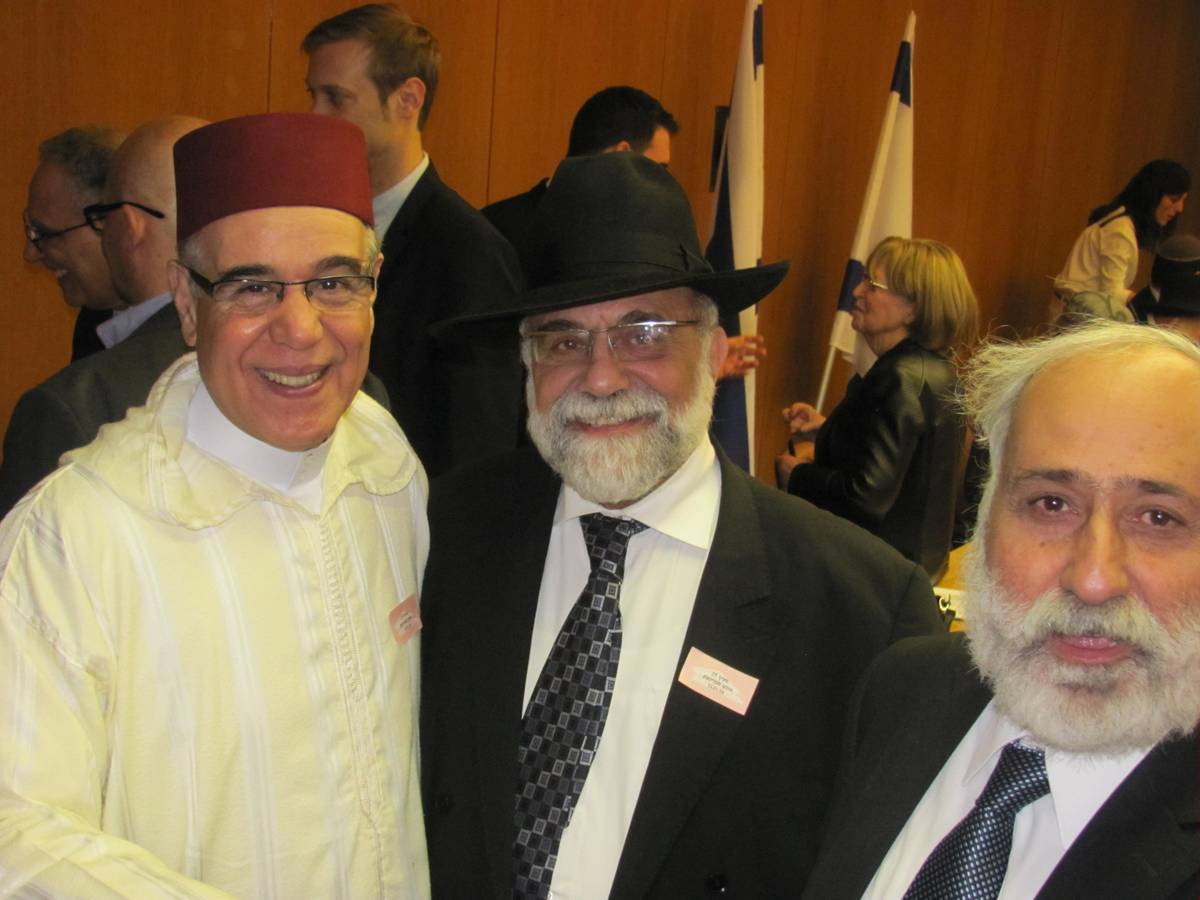At the Knesset, a Meeting of the Minds to Discuss Religion as a Conduit for Peace
‘Change needs to come from a deeper place, and religion reaches those deep, painful areas’




The scene inside the Knesset Tuesday night was peculiar, even by its typically offbeat standards, as an eclectic band of rabbis, sheikhs, politicians, and community activists gathered in the basement to talk about religion and peace. The mood was jovial from the outset. Before taking their seats, rabbis in black hats or large yarmulkes hugged sheikhs wearing colorful kaffiyehs, and they bantered back and forth in Hebrew and Arabic like childhood friends. The generous shows of affection read like a Utopian challenge: Look at how easy this is.
Indeed, there was genuine warmth on display between Jews and Muslims, many of whom seemed to revel in the uniqueness of the occasion. Sheikh Ibrahim Ahmad Abu El-Hawa, a 74-year-old activist who said he preaches “peace and love” from his home on Jerusalem’s Mount of Olives, greeted Rabbi Yehudah Glick, a controversial advocate for Jewish prayer on the Temple Mount who survived an assassination attempt over a year ago. “Alhamdullilah,” Glick replied using the Arabic praise for God, adding cheekily, “as they say in Yiddish.”

As I sat there, watching, I wondered: Is the path to peace and coexistence really to be found in a religious rapprochement, or is the realm of faith, so messy and loaded with passions, best left out of the picture?
This question, it seems, cuts to the core of Tuesday’s gathering, a conference called “Building a Culture of Peace: Emergency Session,” which was jointly sponsored by the Inter Parliamentary Coalition for Global Ethics, the Movement for the Culture of Peace and Reconciliation, and Al-Sadiqin. All three groups aim to articulate a plan for peace in religious terms, emphasizing bonds of monotheism and shared ethical principles extracted from scripture.
Rabbi Ben Abrahamson, 54, who together with his wife, Rebecca, run Al-Sadiqin and helped organize the event, immersed himself in interfaith work after surviving two Jerusalem terrorist attacks—on one occasion his car was “riddled with bullets,” on another his bus was struck by a suicide bomber—in 2001. “I had to understand where that hatred came from,” explained the Los Angeles-born Abrahamson.
Today, despite being an Orthodox rabbi with the garb to match, Abrahamson studies the Quran and fields questions from thousands of Muslims across the world via his popular Facebook page. His research explores “the commonalities between Islam and Judaism,” he said, leading towards “conflict resolution in line with Islamic and Judaic values, which is the key to lasting peace.” Whereas Abrahamson seeks to show that Islam and Judaism are religiously compatible, others have more moderate ambitions.

“More important than agreement,” said Yehuda Stolov, the founder of the Interfaith Encounter Association “is finding a way to disagree in a friendly way.”
Hadassah Froman, widow of the controversial West Bank rabbi and peace activist Menachem Froman, argued that religious dialogue is uniquely equipped to grapple with the prevailing culture of distrust between the Jewish and Muslim communities. “Change,” she said, “needs to come from a deeper place, and religion reaches those deep, painful areas.”
This statement, of course, flies in the face of conventional wisdom, which sees faith as an inflammatory agent, and prefers to focus instead on a negotiated political settlements. But several members of last night’s conference expressed deep frustration, even antipathy, at the “Western” peace process.
“The West has to get off our back,” announced Rabbi Gabriel Reiss, a native of Los Angeles who now lives in the West Bank. “We are in the Middle East and we have a different idea,” he said, describing a mutual understanding achieved by Jews and Muslims wherein they can live according to the “authentic” principles of their respective religions.
“If our forefather Abraham were to come and ask us why we are killing each other, what would you answer?” asked Sheikh Hussein Abu Sneini, a member of a powerful Hebronite family. “Is this land not big enough? Do we not believe in the same one God?”
“I think me and Sheikh Abu Sneini are in the same boat,” replied Reiss. Then the two embraced, but Abu Sneini requested that he not be photographed, presumably because he was wary of backlash from Palestinians who may not appreciate his overtures toward a settler rabbi in the Knesset building.
Despite rallying around a shared monotheism as a uniting force, some panelists introduced ideologies that were bound to cause some friction, such as when Nadeem Amaar, the former mayor of a Druze village in the north, suggested that “the Druze can be a bridge for peace and tolerance in the region.” Said Amaar, “In the Druze faith there is no territorial ambition.” It is doubtful, though, whether any Muslims or Jews in the room considered adopting Druze beliefs as a solution to territorial disputes.
At one point Zionist Union MK Merav Michaeli wandered into the conference, apparently having only just learned it was taking place. In her impromptu remarks she argued that the path to peace runs through “the equality of men and women,” adding that “acceptance of feminist culture is necessary to promote a culture of peace.” One wonders whether the rabbis and sheikhs agreed.
Nonetheless, many of the panelists are already translating their visions into practice. Take, for example, Stolov, who founded the Interfaith Encounter Association, a forum in which Jews and Muslims study their traditional texts together in an effort “to build peace on a grassroots level,” he said. The organization now boasts 73 study groups across the country.
Hadassah Froman also founded a study group, Keren Chai Shalom, an interfaith women’s gathering in the West Bank that discusses Jewish and Islamic texts about women. “We want to focus on what connects us, our femininity,” she explained, “not on what separates us.”
Jesse Lempel is a rabbinical student at Yeshiva University’s Theological Seminary.